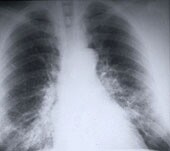 |
 |
 |

Lung Cancer May Be Deadlier for Men
Gender is the major socioeconomic factor influencing outcomes, study finds|
|
HealthDay
By Robert Preidt
Thursday, November 13, 2008
 THURSDAY, Nov. 13 (HealthDay News) -- Men are more likely to die from inoperable non-small cell lung cancer than women, U.S. researchers report.
THURSDAY, Nov. 13 (HealthDay News) -- Men are more likely to die from inoperable non-small cell lung cancer than women, U.S. researchers report.
In fact, gender is the most important factor influencing overall survival of patients with this disease, the new study found.
A team of researchers in six U.S. cities studied 1,365 patients enrolled in national group trials to determine the effect of such sociodemographic factors as gender, race and marital status on lung cancer outcomes.
They found that men had a 1.23 times higher death rate than women, while race and marital status didn't significantly affect outcomes.
"Our study corroborates the fact that gender plays an important role as a prognostic factor in people diagnosed with lung cancer," the lead author, Dr. Benjamin Movsas, chair of the radiation oncology department at Henry Ford Hospital in Detroit, said in a news release. "This underscores the importance of studying this disease entity in light of the fact that women diagnosed with lung cancer tend to have a better outcome in terms of survival."
The study was to be presented Thursday at the Chicago Multidisciplinary Symposium in Thoracic Oncology.
At the same meeting, another group of U.S. researchers, from the South West Oncology Group, reported that a combination of traditional chemotherapy with targeted therapies called monoclonal antibodies was safe and improved survival of patients with advanced non-small cell lung cancer.
The study found that the use of two targeted therapies (bevacizumab and cetuximab) with chemotherapy (carboplatin and paclitaxel) as first-line treatment improved the survival of 104 patients who were evaluated between August 2006 and September 2007. There were no safety concerns.
"The combination of multiple targeted therapies in addition to chemotherapy may be the future of treatment in lung cancer," lead author Dr. Edward Kim, an assistant professor in the department of thoracic/head and neck medical oncology at M.D. Anderson Cancer Center in Houston, said in a news release. "Blocking more key cancer pathways such as the epidermal growth factor receptor and vascular endothelial growth factor may lead to improved cancer control."
In 2008, about 215,000 new cases of lung cancer will be diagnosed in the United States and 161,840 people will die from the disease, according to the U.S. National Cancer Institute.
HealthDay
Copyright (c) 2008 ScoutNews, LLC. All rights reserved.
Related News:
More News on this Date
Related MedlinePlus Pages:
| Home | Health Topics | Drugs & Supplements | Encyclopedia | Dictionary | News | Directories | Other Resources | |
| Disclaimers | Copyright | Privacy | Accessibility | Quality Guidelines U.S. National Library of Medicine, 8600 Rockville Pike, Bethesda, MD 20894 National Institutes of Health | Department of Health & Human Services |
Date last updated: 14 November 2008 |




